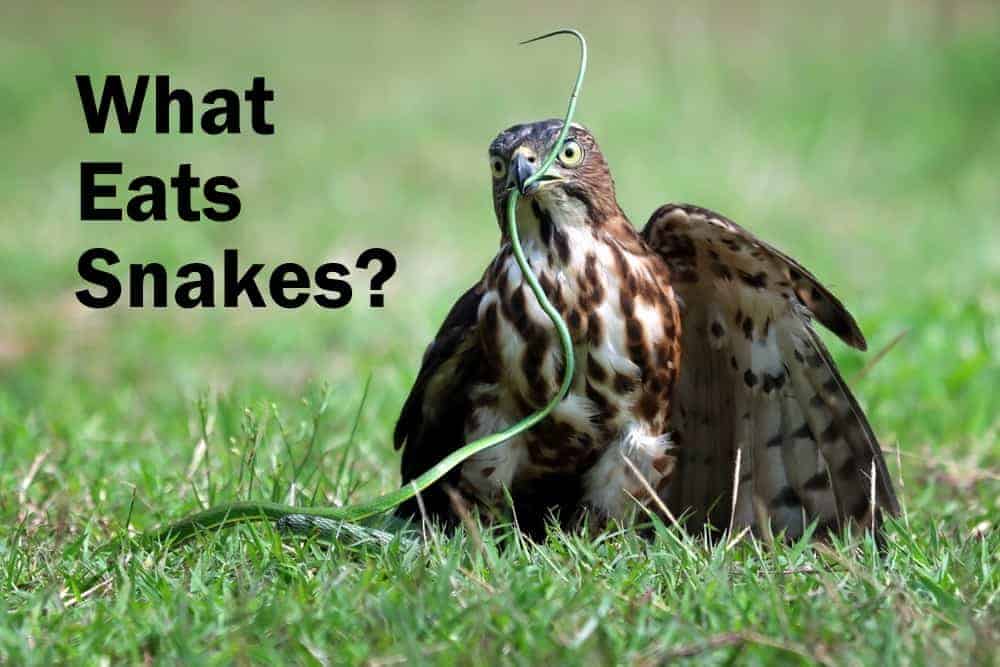Why Ask “What Eats Snakes” in the First Place?
Two reasons, really. First, it’s just fascinating: snakes are predators themselves, so seeing who can turn the tables is wild. Second, if you live where snakes show up (I do!), knowing what hunts snakes helps you understand your local ecosystem and even make your property more wildlife-friendly. Don’t worry—I’ll keep things practical and easy to understand. No biology degree needed.
How Predator–Snake Battles Usually Play Out
Before we list the hunters, here’s how these encounters tend to go:
- Ambush vs. agility: Many snake predators use surprise attacks (owls dropping in, cats pouncing). Others, like mongooses, rely on quick reflexes and teamwork.
- Head control: The safest way to subdue a snake is to immobilize the head. You’ll see raptors pin it with talons, mammals bite behind the skull, or other snakes grab the head first.
- Toxins and immunity: A handful of predators (mongoose, honey badger) have partial resistance to certain venoms. Most others avoid getting bitten at all.
- Opportunism: Many animals don’t specialize in snakes, but if a snake is available, they’ll take it—especially young or injured snakes.
Birds of Prey: Top of the “What Hunts Snakes” List
Raptors are often the first answer to what eats snakes. Their vision, speed, and talons make them natural snake hunters.
1) Hawks (Red-tailed, Cooper’s, and others)
I’ve watched red-tailed hawks snatch garter snakes right off trail edges. They spot movement, swoop fast, pin with talons, and finish with a precise bite. They’ll swallow small snakes whole; larger ones get torn into pieces.
2) Eagles (Bald, Golden, and Serpent Eagles)
Golden eagles and various serpent eagles are famous for snake meals. They have the strength to handle big, writhing prey. If you’ve ever wondered what animals eat snakes in open fields or cliffs—eagles are high on the list.
3) Owls (Great Horned, Barn, Barred)
Nighttime answer to what eats a snake? Owls. Great horned owls, with their crushing grip, feed on snakes after dark. Their stealth is unfair in the best way.
4) Secretary Bird (Africa)
Built like a runway model and kicks like a black belt, the secretary bird stomps snakes to death on the savannah. It’s one of my favorite “what hunts snakes” examples you’ll ever see.
5) Roadrunners (Southwestern U.S.)
Yes—the cartoon bird. Real roadrunners whip small snakes against rocks and gulp them down. They’re quick, clever, and very real participants in the “what eats snakes” story.
Mammals That Eat Snakes: Nimble, Tough, and Sometimes Venom-Resistant
Mammals don’t all love snake dinners, but the ones that do are bold.
6) Mongoose
The classic answer to what hunts snakes in parts of Africa and Asia. Mongooses use lightning-fast dodges and tag-team tactics. Some species have partial resistance to neurotoxic venom, which helps but doesn’t make them invincible.
7) Honey Badger
If attitude could be bottled, honey badgers would sell out. They raid snake nests, stand up to cobras, and seem to have a tolerance to some venoms. “What eats a snake bigger than itself?” Sometimes this fearless tank.
8) Foxes, Coyotes, Jackals
These canids are opportunistic. If a snake crosses their path—especially a small or sluggish one—it’s dinner. I’ve seen foxes shake small snakes to stun them before swallowing.
9) Bobcats, Lynx, Wildcats
Stealth + pounce = snake snack. Cats go for the head, then avoid coils by re-gripping. They’re not immune to venom, so technique matters.
10) Raccoons, Opossums, Skunks
Night shift cleanup crew. They don’t specialize in snakes, but they’ll raid nests and take small snakes when easy.
11) Domestic Animals (Cats, Dogs, Chickens, Turkeys)
Your barnyard might already be part of the “what animals eat snakes” network. Chickens and turkeys will peck and kill small snakes; barn cats often do the same. Caution: dogs and cats risk bites if they pick a fight with a venomous species.
Other Snakes: Kings of “What Eats Snakes” (Literally)
Few answers to what eats snakes are more accurate than: other snakes. Some species evolved to specialize in snake prey.
12) Kingsnakes (North America)
The name says it all. Kingsnakes are constrictors that regularly eat other snakes, including venomous ones like rattlesnakes. Their resistance to certain venoms and powerful coils make them top contenders in the “what hunts snakes” arena.
13) Eastern Indigo Snake (Southeastern U.S.)
Nonvenomous, large, and confident, indigo snakes are apex serpent-eaters. They’ll take down rattlesnakes and cottonmouths, often by pinning the head and swallowing alive.
14) Coachwhips and Racers
Fast day-hunters that take smaller snakes when the opportunity arises. If you’ve ever asked what eats a snake in scrubland or open fields, these whiplike predators qualify.
15) King Cobra (Asia)
The largest venomous snake in the world is primarily ophiophagous—meaning it mostly eats other snakes. It’s a dramatic example of “what animals eat snakes” within the reptile world itself.
Reptiles and Amphibians That Eat Snakes
Not all snake meals happen in trees or on open ground. Reptiles and amphibians get in on the act too.
16) Monitor Lizards (e.g., Nile, Savannah, Komodo)
Powerful jaws, thick skin, and no fear. Monitors will eat snakes when available. Large species can overpower substantial serpents.
17) Crocodiles and Alligators
In swamps and rivers, the answer to what eats snakes is often a toothy ambush. If a snake swims too close, it’s a sudden, scaly end.
18) Large Frogs and Toads (Bullfrogs, Cane Toads)
This one surprises people: big amphibians are ultra-opportunists. Juvenile snakes are fair game if they fit into that wide mouth.
Non-Raptor Birds That Eat Snakes
Even outside the hawk-eagle-owl trio, birds play a huge role in the “what hunts snakes” story.
19) Herons, Egrets, Storks, Cranes
Waders have stealth, speed, and precision. In marsh edges and ditches, they spear and swallow small water snakes and juveniles.
20) Crows and Ravens
Smart and collaborative. They’ll mob a snake and peck it into submission, especially if it’s young or injured.
21) Secretary Bird (worth a second mention)
Because it’s that cool—and a memorable answer whenever someone asks what eats a snake on the African plains.
Fish and Invertebrates That Eat Snakes
It’s not common, but it happens—especially when snakes take to water.
22) Large Fish (Largemouth Bass, Catfish, Pike)
Water snakes and baby snakes that stray into lakes or ponds can be swallowed by big fish. It’s a reminder that “what animals eat snakes” includes underwater ambushes, too.
23) Giant Centipedes and Large Spiders (Regional, Rare)
There are documented cases of giant centipedes subduing small snakes with venom and speed. It’s not common, but it’s real—and a wild entry on any “what hunts snakes” list.
Quick Reference Table — What Eats Snakes, Where, and How
| Predator | Region | Primary Tactic | Typical Snake Prey |
|---|---|---|---|
| Red-tailed Hawk | North America | Swoop, pin with talons | Garter snakes, rat snakes |
| Great Horned Owl | Americas | Night ambush, powerful grip | Small to medium snakes |
| Secretary Bird | Sub-Saharan Africa | Stomping, head control | Venomous & nonvenomous |
| Mongoose | Africa, Asia | Dodging strikes, quick bite | Small to medium snakes |
| Honey Badger | Africa, SW Asia | Brute force, venom tolerance | Snakes, eggs, carrion |
| Kingsnake | North America | Constrict, venom resistance | Other snakes (incl. venomous) |
| Eastern Indigo Snake | SE United States | Pin head, swallow alive | Rattlesnakes, water snakes |
| Monitor Lizards | Africa, Asia, Oceania | Overpower with jaws | Ground-dwelling snakes |
| Herons & Egrets | Worldwide (wetlands) | Stab & swallow | Water snakes, juveniles |
| Roadrunner | SW United States | Whip against rocks | Small desert snakes |
Common Questions I Get About “What Eats a Snake”
Do owls eat snakes?
Yes. Great horned owls, barred owls, and barn owls regularly take small to medium snakes. If you’re wondering what hunts snakes silently at night—owls are your answer.
Do eagles and hawks eat venomous snakes?
They can. Raptors avoid the head and use their talons to immobilize. Many prey choices are nonvenomous, but if the opportunity is good, they’ll take venomous snakes too.
Which snake eats other snakes most often?
In North America, kingsnakes are famous for it. In the southeastern U.S., eastern indigo snakes are legendary. In Asia, the king cobra is a specialized snake-eater.
What eats snakes in my backyard?
Depending on where you live: hawks, owls, cats, dogs (not recommended), chickens, roadrunners, foxes, or raccoons. If you’re in the Southeast, you might even have helpful kingsnakes around.
Do frogs and fish really eat snakes?
They can—mostly juveniles and small species. Large bullfrogs and big freshwater fish are opportunistic.
Safety Tips: Watching “What Hunts Snakes” Without Getting Hurt
- Give space: If a predator is handling a snake, observe from a safe distance. Both animals can be dangerous if startled.
- Know your locals: Learn which snakes in your area are venomous so you don’t try to “help” in a risky situation.
- Pets & kids: Keep dogs on leash near tall grass or water; teach children to look, not touch.
How to Encourage Natural Snake Predators (If You Want Fewer Snakes)
If your real question behind what eats snakes is “how do I have fewer around my house?”—here’s how to support their natural predators without causing harm:
- Raptors: Install a tall perch or leave a dead snag (where safe). Avoid rodent poisons—poisoned mice can kill hawks and owls.
- Backyard birds: Keep a mix of shrubs and open space. Native plantings invite insect life, which supports the whole food web.
- Reduce rodent attractants: Secure chicken feed, compost, and trash. Fewer rodents = fewer snakes.
- Water features: If you keep ponds, expect herons. They may take small snakes naturally.
Note: Chickens and turkeys will kill small snakes, but they also attract rodents if feed is left out. Balance your goals with good husbandry.
Regional Snapshots — “What Animals Eat Snakes” Near You
North America
Red-tailed hawks, great horned owls, kingsnakes, indigo snakes (SE), bobcats, foxes, coyotes, herons, roadrunners (SW).
Europe
Buzzards, eagles, barn owls, herons, foxes, wild cats, and some mustelids (weasels) take small snakes.
Africa
Secretary birds, eagles, mongooses, honey badgers, monitors, jackals, and crocodiles.
Asia
Serpent eagles, king cobras, mongooses, monitors, fishing cats in wetlands, and various owls.
Australia
Kookaburras, raptors, goannas (monitor lizards), feral cats/foxes, and snakes preying on snakes.
South America
Caracaras, hawks, herons, caimans, big catfish, ocelots, tayras, and snake-eating snakes.
My Favorite “What Eats Snakes” Field Moments
I’ll keep these brief, but they’ve stuck with me:
- Hawk vs. garter snake: Trail-side swoop and pin. Over in seconds.
- Roadrunner with a ribbon snake: Whip, whack, swallow—like a nature documentary happening six feet away.
- Kingsnake in a woodpile: Quiet, confident, and clearly in charge. The neighborhood’s stealthy snake control.
Recap: The Big Picture of “What Eats Snakes”
- Birds of prey (hawks, owls, eagles, secretary birds) are elite snake hunters.
- Mammals (mongooses, honey badgers, foxes, bobcats) eat snakes when opportunity or specialization allows.
- Other snakes (kingsnakes, indigo snakes, king cobra) are some of the most effective snake predators.
- Reptiles & amphibians (monitors, crocs, bullfrogs) and even large fish join the list.
- Backyards can host natural snake control—what hunts snakes might already live near you.
Final Thoughts
If you came looking for a straight answer to what eats snakes, now you’ve got a full roster: raptors from the sky, nimble mammals on the ground, fellow snakes in the brush, and even ambushers in the water. The truth is, snakes are both hunters and hunted, and that balance keeps ecosystems healthy.
Whether you’re a hiker, a homeowner, or just a curious nature fan, knowing what animals eat snakes turns fear into understanding. And once you see the pattern—who strikes from above, who pounces from the shadows, and who swallows a rival whole—you’ll never see a trailside rustle the same way again.


